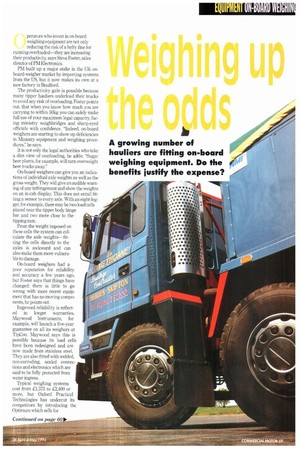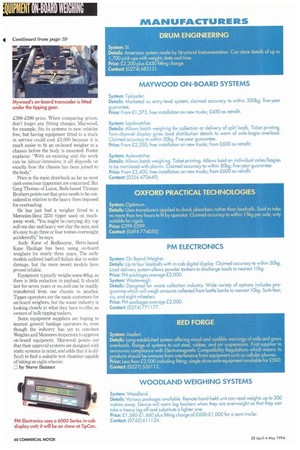perators who invest in on-board weighing equipment are not only
Page 61

Page 62

If you've noticed an error in this article please click here to report it so we can fix it.
reducing the risk of a hefty fine for running overloaded—they are increasing their productivity, says Steve Foster, sales director of PM Electronics.
PM built up a major stake in the UK onboard-weigher market by importing systems from the US, but it now makes its own at a new factory in Bradford.
The productivity gain is possible because many tipper hauliers underload their trucks to avoid any risk of overloading. Foster points out. that when you know how much you are carrying to within 50kg you can safely make full use of your maximum legal capacity, facing ministry weighbridges and sharp-eyed officials with confidence. "Indeed, on-board weighers are starting to show up deficiencies in Ministry equipment and weighing procedures," he says.
It is not only the legal authorities who take a dim view of overloading, he adds: "Sugar beet plants, for example, will turn overweight beet trucks away."
On-board weighers can give you an indications of individual axle weights as well as the gross weight. They will give an audible warning of any infringement and show the weights on an in-cab display. This does not entail fitting a sensor to every axle. With an eight-legger, for example, there may be two load cells placed near the tipper body hinge bar and two more close to the tipping ram.
From the weight imposed on these cells the system can calculate the axle weights—fitting the cells directly to the axles is awkward and can also make them more vulnerable to damage.
On-board weighers had a poor reputation for reliability and accuracy a few years ago, but Foster says that things have changed: there is little to go wrong with more recent equipment that has no moving components, he points out.
Improved reliability is reflected in longer warranties. Maywood Instruments, for example, will launch a five-year guarantee on all its weighers at TipCon. Maywood says this is possible because its load cells have been redesigned and are now made from stainless steel. They are also fitted with welded, non-corroding, sealed connections and electronics which are said to be fully protected from water ingress, Typical weighing systems cost from 41,375 to £2,400 or more, but Oxford Practical Technologies has undercut its competitors by introducing the Optimum which sells for .£399-£599 price. When comparing prices, don't forget any fitting charges. Maywood, for example, fits its systems to new vehicles free, but having equipment fitted to a truck in service could cost £1,000 because it is much easier to fit an on-board weigher to a chassis before the body is mounted. Foster explains: "With an existing unit the work can be labour-intensive; it all depends on exactly how the chassis has been joined to the body."
Price is the main drawback as far as most cash-conscious tippermen are concerned. But Greg Thomas of Luton, Beds-based Thomas Brothers points out that price needs to be considered in relation to the heavy fines imposed for overloading.
He has just had a weigher fitted to a Mercedes-Benz 3234 tipper used on muckaway work. "You might be carrying dry top soil one day and heavy wet clay the next, and it's easy to go three or four tonnes overweight accidentally," he says.
Andy Kane of Redbourne, Herts-based Kane Haulage has been using on-board weighers for nearly three years. The early models suffered load cell failure due to water damage, but the more recent models have proved reliable.
Equipment typically weighs some 80kg, so there is little reduction in payload. It should last for seven years or so, and can be readily transferred from one chassis to another. Tipper operators are the main customers for on-board weighers, but the waste industry is looking closely at what they have to offer, as owners of bulk tipping tankers.
Some equipment suppliers are hoping to interest general haulage operators to, even though the industry has yet to convince Weights and Measures inspectors to approve on-board equipment. Maywood points out that their approval systems are designed with static systems in mind, and adds that it is difficult to find a suitable test chamber capable of taking an eight-wheeler.
by Steve Banner
























































































































